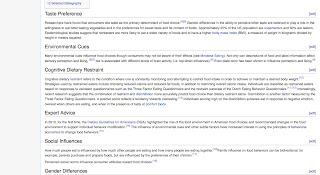Editing a Wikipedia stub is no small feat. On first glance, it seems like a challenging task that would require a large amount of time and effort. That is quite the understatement. Initially, a coherent thought must be constructed as a foundation to build body. Next, reliable peer-reviewed articles must be acquired to provide accurate references for information and for adding credibility. Then, a draft must be written up on the research and newly-acquired information and edit the pre-existing work done by the "performer." What I found to be the most demanding task was understanding the Wiki formatting code to give the appearance of a typical Wikipedia article, though it slowly became easier to navigate. However upon completing the article, I was still having technical issues with using references subsequent times for three of the peer-reviewed sources.
 |
| Food Choice Wikipedia page - after editing complete. From Jasveer Brar's personal collection, March 22, 2012. http://en.wikipedia.org/wiki/Food_choice |
The creators of Wikipedia made it easy for a regular person to create a user account and contribute to the betterment of the site to provide easy-access to all kinds of knowledge for the public. At the same time, this opens the door to vandal, bias, and incorrect information. Any acts of vandalism are quickly discovered, but bias and inaccurate writing can be tougher to detect. When writing my contributions, I noticed there were some arguments I wanted to reinforce more than others, such as the fact that women are more likely than men to choose and consume foods based on health concerns and food content. Though there may be conflicting studies and research that exist, I chose to stand by that statement. It is in such cases that an argument can be swayed to fit the editor's bias. When working on this assignment, I did not intend to let any biases interfere with the integrity of the article but this may not be the case with all editors. It is noteworthy to mention that all sources used arose from esteemed journals and were peer-reviewed articles. Continuing on, building upon a stub can feel like walking over someone's toes as the stub is of their creation and vision. A certain way of writing and idea is already in motion and can be difficult to maintain. Although "food choice" is a broad topic, I wrote from a more specific angle. I chose to explore the differences between age & gender and selection of food, as well as socioeconomic factors that influence which foods are chosen. Whereas the pre-edited article described environmental influences and social influences that control the way we choose food, I opted for a more intimate explanation as to interpersonal differences that can dictate our choice of food and eating habits.
On Wikipedia, there are numerous stubs which need attention to mature to knowledge-rich articles. From my experience, it is easier to work on a stub which is of interest and some knowledge is already present in the mind. Cassandra, a fellow ALES classmate, chose to write about proximal diabetic neuropathy. Being in nutrition, Diabetes Mellitus is a disease which we have all become highly acquainted with and have some basic, if not extensive, information about. As previously mentioned, it is much less demanding to choose a stub to work on if some prior knowledge is known, and that is exactly what Cassandra chose to do. In her blog, she goes on to further explain the benefits of using Wikipedia as a "free encyclopedia," but maintains critical literacy when exploring the many downsides of using a database that is open for the public to "garden."


No comments:
Post a Comment